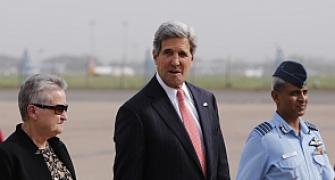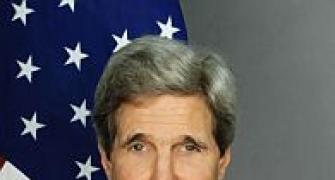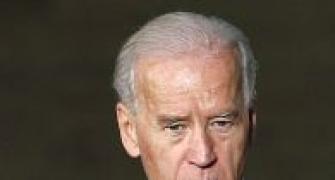 The United States on Monday assured India that its concerns over Taliban insurgents gaining legitimacy without severing their terror links will neither be "overlooked or undermined" during the talks with the Islamic fundamentalist group.
The United States on Monday assured India that its concerns over Taliban insurgents gaining legitimacy without severing their terror links will neither be "overlooked or undermined" during the talks with the Islamic fundamentalist group.
This emerged after the 4th round of Indo-US strategic dialogue in New Delhi that was co-chaired by External Affairs Minister Salman Khurshid and his American counterpart John Kerry and covered key strategic issues of security, defence, nuclear cooperation and trade ties.
Khurshid, at a joint presser with Kerry, said, "This (proposed talks with Taliban) is an experiment that is being done in order to find an alternative for sustainable peace in Afghanistan. One cannot disagree with the issues or dimensions or aspects, which are of concern to us. I must say with gratitude that the secretary of state himself earmarked that and said that as they proceed, they will ensure that none of the concerns of India are overlooked or undermined.
"That is a good way of working closely together. It is very clear what the objective is and how far that objective is possible, only time will tell. But with caution and care being approached as an objective, I think it is something that nobody will have a problem with."
Khurshid was asked if he raised India's concerns over the proposed talks with the Taliban in view of the impending withdrawal of US troops from war-torn Afghanistan.
On his part, Kerry made it very clear that the talks with the Taliban will only be negotiated under "certain conditions. “Thus far, those conditions have not yet been met. So, there are no negotiations at this point. If the conditions are met, then there will be negotiations that will take place. Not with the US but with the high peace council of Afghanistan."
He also said the requirements included that the constitution of Afghanistan must be respected, that they (Taliban) do not affiliate or associate themselves, in fact disassociate themselves, from the Al Qaeda, violence and that the rights of women, minorities will be respected.
"Now, that is not going to change. If it is required to be changed, obviously there will be no agreement. But it is there to explore the possibilities of having a peaceful resolution and conclusion of a political process if it is possible. Ultimately, that will be decided by the Afghan people....", Kerry added.
Kerry also said the US special representative on Afghanistan and Pakistan James Dobbins will be in New Delhi on Wednesday to brief the officials directly on the proposed talks.
"We will continue under any circumstances, the US will continue as President Obama has made it clear to support the Afghan parliament, to support Afghan military, to continue to equip and train well beyond the 2014 and to continue to have a level of force on the ground that will continue to conduct anti-terrorism or counter-terrorism activities,” he said.
"The hope is this could provide an avenue for reduction in violence but there is certainly a course that we are committed to..." he added. He also hailed India as the country equipped to take on some of the biggest challenges of "our time".
Apart from crucial regional issues, the two sides covered key strategic pillars of Indo-US relationship, namely -- security, economics and technology; regional strategic and political issues and global issues.
Kerry, who had five years ago while in the senate led a successful floor debate on the Indo-US civil nuclear deal, also said the two sides hoped that the commercial agreement between the US energy major Westinghouse Electric company and Nuclear Power Corporation of India Limited will be signed in September.
Prime Minister Manmohan Singh, who has been invited by Obama, is expected to travel to the US and hold bilateral talks with him in September.
The two sides also talked about Iran with Kerry terming India's reductions in imports of oil from Iran as an "important step" in bringing pressure on Tehran over its contentious nuclear programme. "We are appreciative that India has worked hard to reduce its dependency on Iranian oil and that has been an important step," Kerry said and also asked New Delhi to urge the Iranians "not to miscalculate about American and international commitment" to stopping Iran from pursuing nuclear weapons.
Iran has been maintaining that its nuclear programme was for peaceful purposes. Washington renewed six-month waivers on its Iran sanctions for India, China and seven other economies earlier this month in exchange for their agreeing to reduce purchases of oil from Tehran.
Kerry and Khurshid also reaffirmed their countries’ strong commitment to work collaboratively to help ensure energy security, combat global climate change and support the development of low-carbon economies that will create opportunities and fuel job growth in both countries.
Image: US Secretary of State John Kerry, on his first visit to India as secretary, gestures to the media at the end of a photo opportunity with Indian External Affairs Minister Salman Khurshid at Hyderabad House in New Delhi'Photograph: Jacquelyn Martin/Reuters








